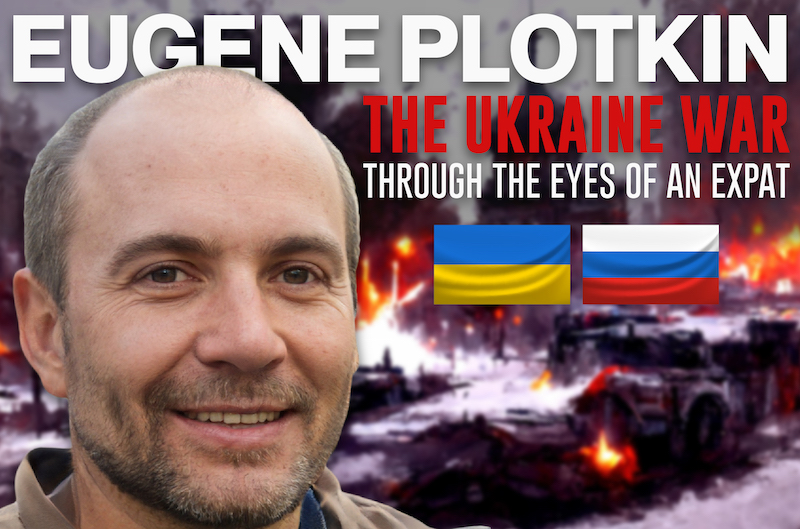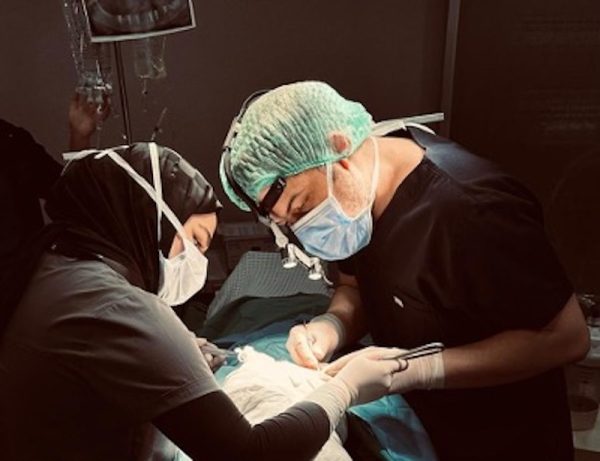Eugene Plotkin: The Ukraine War Through the Eyes of an Expat
Branded Content by Cosmic Press
Since February 2022, when Russia launched a full-scale invasion of Ukraine, the world has been watching.
As tensions and violence have risen in the region, other countries have condemned Russian actions and offered support and aid to Ukrainian refugees and those still stuck in the country and facing Russian attacks. In the United States, media coverage has focused primarily on Russia’s motivations and Ukraine’s fight led by President Volodymyr Zelenskyy.
In recent weeks, sanctions and the breakdown of relations between Russia and the West have led to shortages of food and other goods, as well as raw materials, in the U.S. Notably, gas prices in many parts of the U.S. have skyrocketed to reflect the economic crisis caused by the conflict.
Russian-born expatriate Eugene Plotkin shares his take on the state of affairs in Ukraine and Russia’s biggest challenges going forward. Plotkin is a Harvard-educated fintech consultant and CEO who has been watching this conflict play out while living in the U.S.
The West Sanctions Russia
According to Plotkin, what’s happening now is “essentially a proxy war between the West and Russia.” The West supports Ukraine and its pro-Western government, but they can’t directly intervene with NATO. Since Russia and NATO have been in opposition since the Cold War, this would trigger an escalation that no one is willing to initiate.
Instead, the West is trying to isolate Russia economically to weaken its ability to fight Ukraine and continue to gain ground. “But,” Plotkin elucidates, “I feel like [these policies] were crafted by politicians oftentimes, because the economic impact is the opposite of what they’re trying to do.”
The West banning exports from Russia, especially highly valuable raw material exports like oil and gas, only increases their value. Russia is making just as much on the exports, while they increase in price for everyone else. This is happening in the West, where the price of gasoline is rising.
How Russia Is Still Coming Out on
Plotkin says: “In terms of just people I know in Russia, their lives haven’t changed. So the biggest impacts they’ve noticed are certain clothing stores, certain brands have left. Certain brands of franchises, certain brands of food, but there is no real impact on daily life. You’re still able to go to your coffee shop.” And Russia isn’t just relying on exports; their gross domestic product (GDP) is largely based on internal economic activity.
With Russia experiencing a few shortages, at the worst, as a result of these policy changes, some wonder if the U.S. and NATO are doing enough. At the end of the day, it’s the Ukrainians who are suffering daily from escalating tensions and the impasse in peace negotiations.
Plotkin says, “I think a lot of these actions, while they sort of look maybe good on paper or in sound bites, economically have not actually hurt Russia.”
Can We Afford a New Strategy?
The reason Plotkin believes it’s not working is that “the West, the collective West, doesn’t control all of the markets.” Perhaps there’s a chance for the West to adopt a better strategy in this conflict. By cutting off all trade, not just from the West but also from countries like China and India who are still willing to trade with Russia, Plotkin explains, there could be a bigger impact on Russia.
The reason it would be problematic is that European countries, even those in NATO, might not be willing to play along. It would be a detriment to their people — a much higher price than inflation in the cost of gas and a few missing items at the grocery store.
Plotkin distills the issue: “It’s very difficult to really economically isolate a country that is a net producer of raw materials because you want their raw materials. Your citizens in the West, they want, you know, you want your iPhone, and you want your superfast laptop and you want your electric car. All these manufactured goods rely on the use of raw materials.”[Text Wrapping Break]
Decisions To Make
The current policies seem to be making Western economies worse, and Plotkin says, “I don’t know what they’re doing to help Ukraine.”
Right now, the West is stuck strategically. On the one hand, the current sanctions don’t seem to be penetrating Russia’s economy and isolating the country enough to halt the violence from their side. On the other, involving NATO or getting tougher with the sanctions could trigger World War III.
Russia is looking at an uncertain future. According to Plotkin, the West is saying, “Well, we just want to do something that seems like punishment without necessarily thinking through all the implications of that.”
Eugene Plotkin is a Russian-born finance, business, and technology professional who lives and works in New York City. He is the CEO and co-founder of fintech startup TechWallet and a consultant with a passion for financial technology. After many years of investment banking, Eugene Plotkin wants to bring the transformative power of fintech to everyone.
Branded content furnished by our promotional partners. The Daily Sundial editorial staff is not involved in its production. Content does not reflect the views or opinions of the editorial staff.





